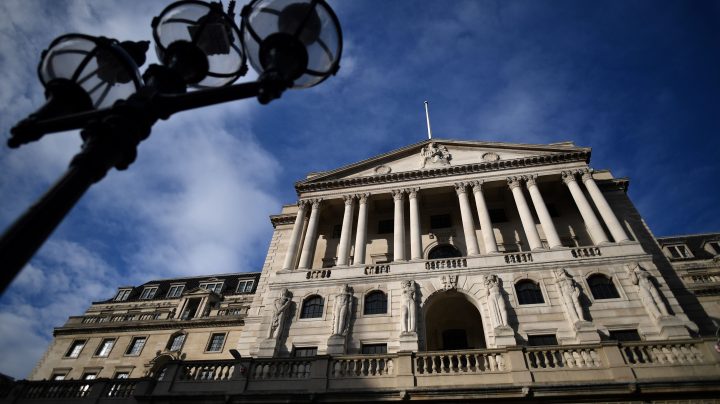
With more Brits retiring early, the Bank of England warns of a shrinking workforce — and rising inflation
With more Brits retiring early, the Bank of England warns of a shrinking workforce — and rising inflation

The Bank of England has warned that inflation could be prolonged in the United Kingdom because of a curious — and in Europe, an almost uniquely British — problem: The U.K.’s workforce has shrunk.
Unlike in other major European economies, the number of people of working age in the U.K. who don’t have a job and are not looking for one is larger than it was before the pandemic. One of the major reasons may be early retirement.

Seated on a small hill overlooking the beautiful Swanage Bay on the south coast of England, which glittering in the winter sun, David Rawsthorn is clearly enjoying his retirement.
“Even just sat here on this bench looking out over the sea, I find myself thinking, ‘I don’t want to exchange anything for this,’” he said. “I enjoy this. I enjoy having that freedom of time, that freedom of movement to do what I want to do.”
Rawsthorn lost his job as a marketing manager at the height of the pandemic and then decided, at the age of 58, to retire early after four decades of full-time work.
“Over the last few years … you know, I think you just get to the point where you start to think, ‘I’m not enjoying this as much as I used to anymore.’”
Today, he’s studying for a master’s degree in history, renovating the stone cottage where he lives, and soaking up the scenery. Retirement is a lot more fun than working full-time, he said.
The trouble is that hundreds of thousands of his fellow Brits have come to the same conclusion. And that’s begun to worry not only the Bank of England but also members of the Economic Affairs Committee of the House of Lords, the upper house of Parliament.
The committee has just published a report on the U.K.’s shortage of labor, and it found that a major cause of the problem has been the departure of more than half a million people of working age from the labor market.
“A key driver in the rise of this inactivity appears — and I emphasize ‘appears’ — to be an increase in the number of people who are aged 50 to 64 years old who are retiring early,” Lord Bridges, chairman of the committee, told Marketplace.
“That’s a problem because labor shortages will potentially drive up inflation, damage growth in the short term and reduce tax revenue, the revenue available to the government for the public finances that we all want,” Bridges said.
His committee couldn’t conclusively explain the surge in early retirement, but Bridges did put forward a number of hypotheses: For example, the fact that people were able to build up their savings during the pandemic may have given them sufficient confidence in their financial resilience to quit work.
Jon Boys of the Chartered Institute of Personnel and Development thinks the early retirement boom may have been inadvertently triggered by the U.K.’s furlough scheme, through which millions of workers were paid not to work for weeks on end.
“Habits set in. It becomes a bit more difficult to do things,” Boys said. “People really did have time to get a taste for it; I think there probably is something in that theory.”
Although other countries in Europe had similar furlough schemes and a similar rise in the level of household saving, the U.K. is virtually unique in Europe for its large exodus of older workers.
Why? Many economists are scratching their heads.
“That’s a very difficult question to answer and, to be honest, I can’t think of any particular reason. It’s just unusual and hard to understand,” admitted Stephen Millard, Deputy Director of the National Institute of Economic and Social Research. ”People did undoubtedly re-evaluate their relationship with the workplace during the lockdown. You can think of all sorts of reasons like that, but the trouble is they apply elsewhere, too.”
Millard accepts that the exodus of older workers could be inflationary and pose a threat to the public finances, but he doesn’t necessarily see it as negative.
“For the bulk of people who have become economically inactive, they have done it voluntarily and, in that sense, the fact that so many more people have become inactive suggests that so many more people are able to. And that’s a good thing,” he said.
Jon Boys, labor market economist at the CIPD, agreed. “Is this early retirement surge a bad thing? I don’t think it’s necessarily an unambiguously bad thing if people have got so wealthy that they’ve got the means to retire early.”
But are they indeed sufficiently wealthy? And could this trend be self-correcting?
Back in his seaside home, David Rawsthorn loves the freedom of retirement, but financial doubts are creeping in. He planned his departure from the workforce two years ago on the basis of inflation at 3% or 4% .
“Unfortunately, with inflation running at between 10% and 11%, I fear the wheels may be coming off my projections,” he said. “I have been getting that monthly shock when I see the gas and electricity bills come in. Our heating bills have trebled in a year, and we’re noticing the price of food has gone up quite a bit. I may have to rethink my plans.”
So would he consider going back to work?
“I would consider going back to work — I would, if inflation stays this high,” he said. “We’re not in trouble at the moment by any means, but you can just see on the horizon the dark clouds.”
The silver lining for the government and the Bank of England would be if the exodus goes into reverse, the early retirees return to work, and the U.K. labor force stops shrinking.
There’s a lot happening in the world. Through it all, Marketplace is here for you.
You rely on Marketplace to break down the world’s events and tell you how it affects you in a fact-based, approachable way. We rely on your financial support to keep making that possible.
Your donation today powers the independent journalism that you rely on. For just $5/month, you can help sustain Marketplace so we can keep reporting on the things that matter to you.

















